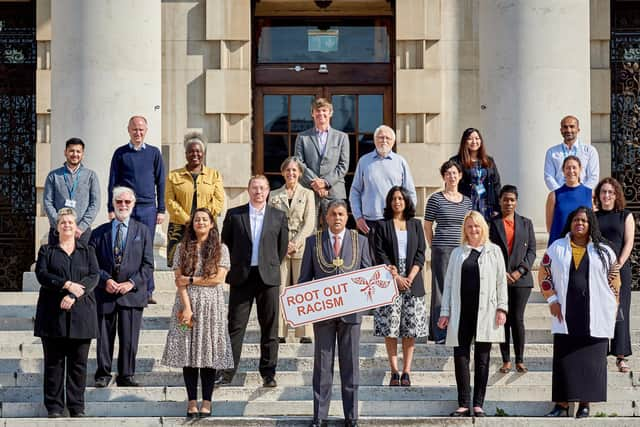Leeds launches racism pledge as city leaders admit we live in "structurally racist society"
and live on Freeview channel 276
The Root Out Racism pledge, which was announced by Leeds City Council today, will see the council, along with 40 other organisations across the city, sign up and support the movement.
Health and political leaders say the pledge is needed due to institutional racism in the UK – often a structural and unconscious bias against those from minority ethnic backgrounds.
Advertisement
Hide AdAdvertisement
Hide AdThe deputy leader of Leeds City Council, Coun Jonathan Pryor, used examples such as school leadership and apprenticeships where more needs to be done to give an equal chance to BAME individuals.


The pledge itself states: “As leaders in Leeds, we pledge to work together to Root Out Racism in all its forms across our organisations and our city.
“Eradicating racism is everybody’s business and we all have a role to play in challenging racism wherever we find it. Leeds is a richly diverse and multicultural city, something that we all consider to be one of our key strengths.
“We are proud of our fantastic individuals, communities and organisations that work tirelessly to create a fairer city for everybody and will continue to support and work with them. We are committed to building a city in which everyone feels safe, valued and that they belong. At the core of this commitment, is that we stand up to racism in all its forms. While we are proud of the progress we have made across Leeds, we recognise that racism and discrimination still exist and that there is more work to be done.
Advertisement
Hide AdAdvertisement
Hide Ad“We are committed to having the challenging conversations about how we can do more to eradicate racism and discrimination and to support those who have experienced it. Together we will ensure that racism has no place in Leeds.”
Read More: Racism in Leeds is alive and wellCEO of Leeds Community Healthcare Trust Thea Stein said: “Are we attracting and maintaining within our workforce people from the diverse communities we serve – we are not doing that well enough and we need to.
“If you are served by somebody you feel a real connection to, you will feel more confident about your health. How we recruit people from diverse communities, and they feel like they can thrive – it is important for us.
“Also, how do we serve the public better. How do we serve you in a way that suits you?
Advertisement
Hide AdAdvertisement
Hide Ad“Cultural change takes time, and it takes time to embed. I know people from black and minority ethnic communities feel safe in my organisation, but that doesn’t happen overnight. Nobody will see instant change.
“We live in a structurally racist world and in a structurally racist society. To understand that, you first have to own that, and know what it means. You need to know when you have white privilege like I have, and how to utilise it.”
While the pledge follows recent internationally-discussed racial topics such as the black lives matter movement, and online racial abuse suffered by black England footballers during Euro 2020, one of the pledge’s leading voices said institutional racism is not a new problem.
Wendy Tangan, clinical services inclusion lead for Leeds and York Partnership NHS Trust, said: “This isn’t a topic that started last year – this is a topic that has been going on for a very long time.
Advertisement
Hide AdAdvertisement
Hide Ad“I have to admit, with 2020, black lives matter and the killing of George Floyd, it highlighted specific issues of race, but work has been going on across decades in trying to address inequalities in health.
“Last year we commissioned a report looking at the impact of Covid, and as a result we were able to get big priorities and recommendations. One recommendation was to do this work.”
Schools
Deputy leader of Leeds City Council Jonathan Pryor said: “It’s not an overnight process – racism is endemic, but hopefully some of our efforts will tackle and improve things. One key area we need to look at in schools is leadership. A lot of senior leadership teams are very white. That is not to place the blame on individuals, it is just where we have reached and what we need to tackle.
“It would make a difference for a young black kid seeing black people in positions of leadership in their school. It would make a difference to see people who look like them and are from a similar background.”
Comment Guidelines
National World encourages reader discussion on our stories. User feedback, insights and back-and-forth exchanges add a rich layer of context to reporting. Please review our Community Guidelines before commenting.